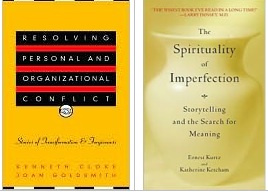See a photo of Andree, her bio, Part 1 of this Q&A, Part 2, Part 3, and Part 4 .
Q&A with Andrée Iffrig, Question 6:
Q: In the workbook for Find Your Voice at Work: The Power of Storytelling in the Workplace, you caution against “Victim Narratives.” Can you talk a bit about why Victim Narratives are not helpful?
A: By now, you have read the section in my book on victim narratives, where I clearly state that everyone has a victim narrative, and you need to tell it and know you’ve been heard before you can move on to becoming a survivor or hero.
Victim narratives are not helpful if you never move on from narrating them; if you remain permanently stuck in the victim’s role. In the book there is a story about a dean of a large faculty at a university who concludes his 10 year tenure as dean feeling like a victim. Can you imagine what it would be like to work for this man, even assuming he tried to be nice to his employees? It would be punishing.
People who have read the section on victim narratives in my book report that as they read Jake, Melanie, and Alistair’s stories, they experience an “aha” moment, recognizing themselves in these stories. Everyone has been a victim at some time, often unwittingly; we just didn’t recognize it. I have learned that victims need to be heard before they move on to being accountable. A story is a way to go from being a victim to becoming a survivor.
For more on this aspect, I recommend two books (both featured in my book):
Cloke and Goldsmith, Resolving Personal and Organizational Conflict.
Kurtz and Ketcham, The Spirituality of Imperfection: Storytelling and the Search for Meaning.

